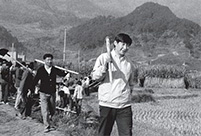 Top 100 beauties in the world!
Top 100 beauties in the world!
 Gallery: Who is the most beautiful one?
Gallery: Who is the most beautiful one?
 If you like autumn, put your hands in the air!
If you like autumn, put your hands in the air!
 Fan Bingbing's "Queen style" in new play
Fan Bingbing's "Queen style" in new play
 Lingerie show at 2014 Miss China
Lingerie show at 2014 Miss China
 J-10 fighters show aerobatic stunts in smog-free sky
J-10 fighters show aerobatic stunts in smog-free sky
 Charming contestants of Shanghai Int’l Model Contest
Charming contestants of Shanghai Int’l Model Contest
 Most amazing chi-pao beauties
Most amazing chi-pao beauties
 7 deadly animal attacks
Russia to launch 70 Proton rockets by 2020: official
7 deadly animal attacks
Russia to launch 70 Proton rockets by 2020: officialFormer journalist Gao Yu was on trial Friday in Beijing for "providing state secrets to an overseas organization." Western media and human rights organizations pointed their fingers at the Chinese authorities, accusing them of human rights violations and saying that Gao's case is against China's latest claim that it is pursuing the rule of law.
Gao denied the prosecution's allegations in court, and no ruling was given Friday, Reuters reported.
Gao used to be a journalist with the China News Service in the 1980s. She was jailed in 1989 and released the following year. In 1993, she was sentenced to six years in jail for leaking state secrets to overseas media. She was arrested again earlier this year for sending the full text of a classified document of the Communist Party of China's Central Committee to a foreign website.
Little criticism from the West pointed to the crime itself, but declared that Gao's sending the document is "freedom of speech." This is ridiculous from the angle of law.
Ask any ordinary Chinese people whether it is a crime to obtain a central government document through illegitimate means, key in the content to a computer, and send it to an overseas website. Most people will answer yes.
Would a normal Chinese people do this? Few would dare. But Gao did. She already experienced a jail term for leaking state secrets. She knew the legal consequences of her act.
The leaked file was about the Party leadership's latest policies concerning ideology. It was political content at the center of ideological disputes between China and the West.
The Western media argued that the document Gao sent out should not be classified as state secrets, and that China's definition of state secrets could become a trap of human rights violations. This argument is lame.
Unpublished documents made by the CPC Central Committee are state secrets as clearly defined in the country's Law on State Secrets Protection. The central committee drafts documents and policies, and decides whether it will pass the documents within the Party or to the whole public. It is China's way of running the country. Whether this practice needs any change or not, it is up to China.
The West has been paying much attention to Gao's case,. This seems to be a golden chance to smear China's image and spread the Western values in a perfect frame: a 70-year-old veteran journalist has been arrested for "practicing freedom of speech."
This case is another example of profound ideological conflicts between China and the West. But the hyping of Gao's case will not score much for the West. The Chinese public is clear about the motive behind the West's actions.
 Female soldiers
Female soldiers Celebrity goddesses
Celebrity goddesses  Official trailer of Y-20
Official trailer of Y-20 Photos: Xi Jinping in Fujian
Photos: Xi Jinping in Fujian Standard faces for each countries
Standard faces for each countries China-made military transport aircraft gets ready
China-made military transport aircraft gets ready World Pole Dance Championship in China
World Pole Dance Championship in China 59-year-old Liu Xiaoqing still looks stunning
59-year-old Liu Xiaoqing still looks stunning  Shocking! Photos of Chinese fighters revealed
Shocking! Photos of Chinese fighters revealed Top 10 most dangerous jobs in the world
Top 10 most dangerous jobs in the world  Top 10 fifth generation jet fighters in the world
Top 10 fifth generation jet fighters in the world Top 10 Chinese goddesses
Top 10 Chinese goddesses  Top 20 hottest women in the world in 2014
Top 20 hottest women in the world in 2014 Top 10 pure beauties in showbiz
Top 10 pure beauties in showbiz  Top 10 world's highest-paid models 2014
Top 10 world's highest-paid models 2014 The most gorgeous Chinese women
The most gorgeous Chinese women Top 10 most handsome faces in Asia
Top 10 most handsome faces in AsiaDay|Week|Month